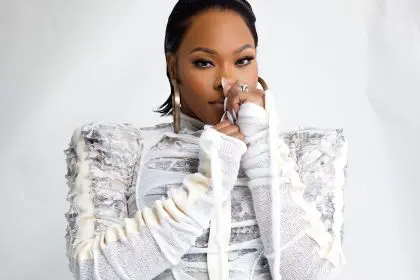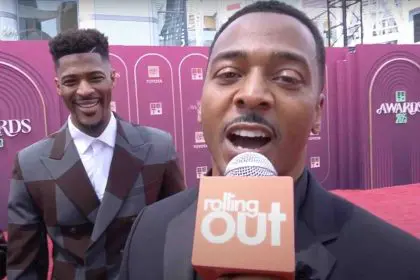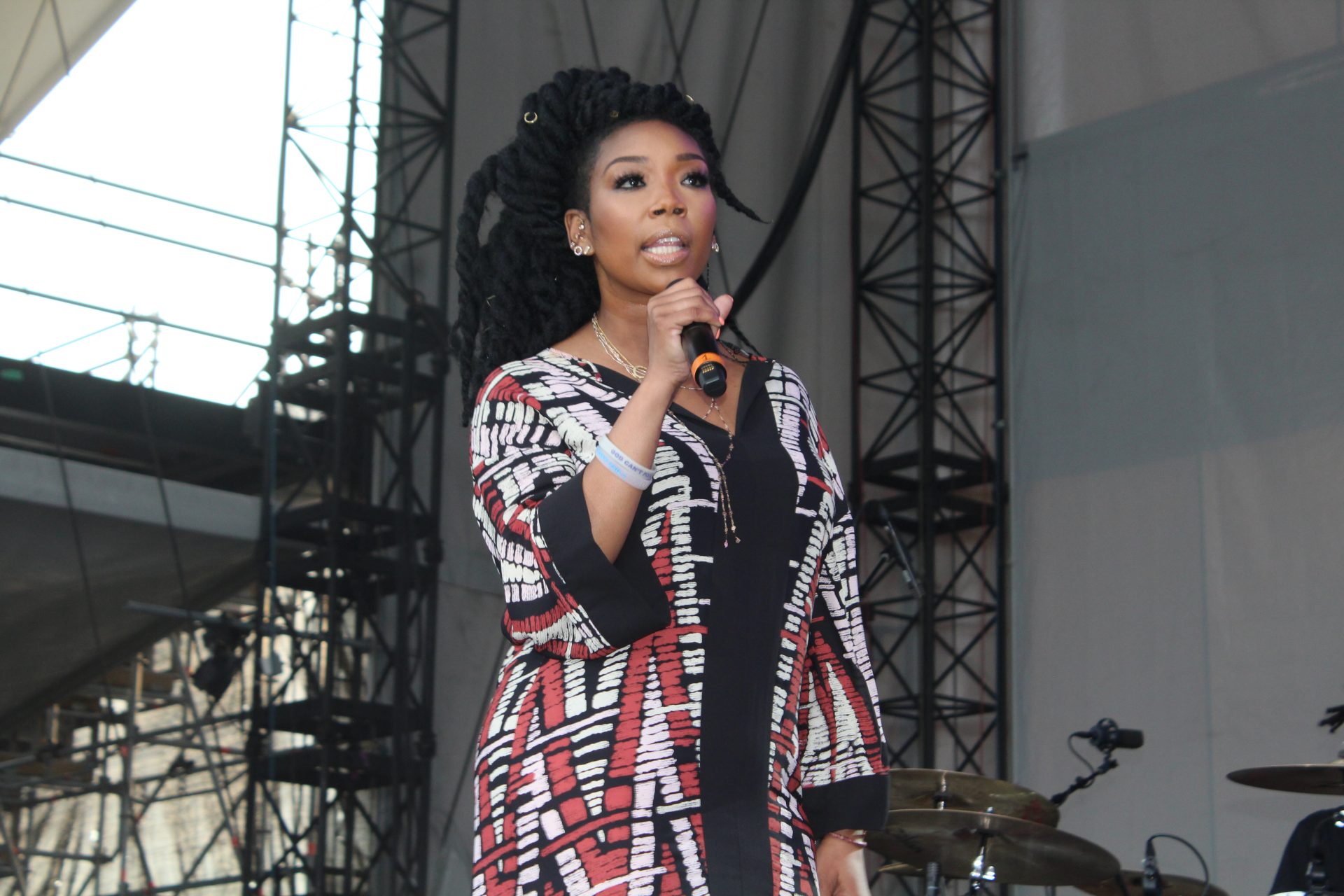 The stage was set for the much-anticipated meeting of the minds between rolling out and noted actor Michael Ealy. Largely adored by the double X chromosomes of the world, Ealy has always come across as a brother whose view of the world is well beyond his years. Maybe it’s the complicated roles that he expertly tackles ranging from “Their Eyes Were Watching God” to Miracle at St. Anna that contribute to our perception of Ealy. Perhaps it was his steely blue eyes, which appear capable of piercing the depths of some cosmic understanding of life and love (one woman actually said that verbatim) … whatever it is, he has it.
The stage was set for the much-anticipated meeting of the minds between rolling out and noted actor Michael Ealy. Largely adored by the double X chromosomes of the world, Ealy has always come across as a brother whose view of the world is well beyond his years. Maybe it’s the complicated roles that he expertly tackles ranging from “Their Eyes Were Watching God” to Miracle at St. Anna that contribute to our perception of Ealy. Perhaps it was his steely blue eyes, which appear capable of piercing the depths of some cosmic understanding of life and love (one woman actually said that verbatim) … whatever it is, he has it.
Rolling out began the interview with a preconceived notion of Michael Ealy, but our time with the Maryland native only enhanced our impressions of the man. A true representative of all that’s right in Black Hollywood, here is a small peek into ro’s eye-opening interview with Ealy.
First off, congrats on the strong opening weekend for Takers. I’m sure that your schedule has been nonstop.
Yes it has, but this is what I wished for. I wanted to be so busy that I needed a vacation, and couldn’t take it … and I got what I wanted, and I thank God for that.
Can you put into words the journey that brought you from your initial desire to become an actor to where you are today?
It was a slow process that required a great deal of patience. I think that’s one of the things that a lot of kids out here don’t understand. Anything worth having is worth waiting for, and worth working very hard for. Of course there will be ups and downs, but ultimately, if you’re passionate about what you do, like I am, then you just have to go for it. It doesn’t really matter what level — whether it’s in a small black arts theater, or on a screen that showcases what you do all over the world … it doesn’t matter, as long as you do it, and as long as you’re passionate about it. That passion will serve you well — especially during the hard times. 
You mentioned the small black theaters. Would you have been content just to play those your whole career?
I think that in the beginning, I was thankful for the opportunity to do it on a smaller scale. In my mind, those small steps were just preparing me for the next bigger steps. By doing it on a small-scale first, I got much better at [my] craft, and it got me ready for bigger opportunities. You can always jump into the big stuff right away and become an international movie star, but you won’t be ready for it. I just thank God that I was given a chance to make sure that I was ready first.
You’ve developed this reputation as being a deep thinker. Do people have you pegged correctly?
I am definitely something of an old soul, and if people consider that to be a deep thinker, then so be it. Listen, I know where I come from and I know from whom I come … so I take that and I take what I do very seriously. But don’t get me wrong. I also have fun too. So the things that people know about me, are only the portions that I let them know. Ultimately for me, it is important to keep it that way. But yes, I can be very silly, so I’m not always some serious deep thinker.
What do you think has contributed to the perception of your gravitas?
I’ve done a lot of projects that have required me to have a certain amount of discipline and focus, so people see me through the projects that I choose. I just happen to prefer engaging in projects that matter. When you are doing a book adaptation, or playing a Buffalo Soldier, these are people who contributed to the betterment of our society. So I can’t take that role and be disrespectful to their legacy. So if people think that I’m deep, or I’m serious, that’s probably where a lot of it comes from. I have respect for this craft, and for the hard fought battles that were endured for me to get to this point as an actor.

So you spend a lot of time studying the work of black trailblazers in your field?
Of course. I think about Sidney Poitier, Sammie Davie Jr., James Earl Jones, and everyone that came before me. That’s probably where my old soul comes from. I think about how serious it was for them to accomplish what they did, and I’m so thankful for them, because I wouldn’t be here in this position if it wasn’t for them … none of us would be. I’m just aware of how far we’ve come, and because of that, I probably do take my job very seriously.
Do you think the community appreciates those that came before us?
I don’t think that we appreciate our forefathers enough as a community. That’s why there are so many kids dropping out of high school, because they don’t understand how much of a privilege it is to have a free education. In the 1960s, getting a free education was like a dream come true for parents, and their kids went to school and achieved because they were previously not allowed to do so. And now that we have the opportunity to freely go to school, some kids just choose to drop out and smoke weed. What kind of sense does that make? If you had a sense of who you are, and where you’ve come from as a person … if you had that understanding … then you wouldn’t be so disrespectful to those who fought so hard.
Are black kids disrespecting their heritage?
Yes, because that’s what they’re doing; when you drop out of school, you’re slapping the face of people who went to school and were called n—-r every day. You’re disrespecting those who were involved in the Brown v. Board of Education case … you’re just slapping all of that hard work in the face by dropping out of school. And it’s not like your parents have to pay for your education. It’s free, and it’s nonsense for you to not capitalize on it.
Does that same mind-set apply with up-and-coming actors?
In terms of acting, I think that there are a lot of people out there talking about how they want to be the ‘next Denzel.’ But Denzel wasn’t the first … he’s had a wonderful career, but he was far from the first. A lot of people had to fight so that Denzel could get the opportunities that he had. He’d be the first one to tell you that as well.
You come across as a passionate brother. Is it your style of leadership to be outspoken about these problems, or would you rather just lead by example?
For me, I would prefer to just kind of do my part, and keep my head down and lead by example. But it seems like in these times you need to be vocal and you need to speak your mind in order for people to really hear you, and for you to make a positive change. I don’t know really how to be more vocal about it, but I know that it’s probably something that I need to do more of.
Is there anything about this generation that gets under your skin?
In this day and age, it seems like the more nonsense that you put out, the more attention you get. I don’t get that, and I don’t want to be a part of that. How people can perpetuate nonsense, and get credit and wealth from it is just mind-boggling to me. And I don’t think that makes me an elitist, because I stay away from that type of behavior … I just think I’m cut from a different cloth.










